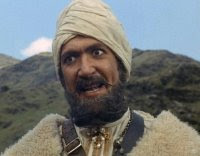Captain Doobie, Goodtime Slim, and the Shed Police The doorbell rang unexpectedly. It was always doing that.
Goodtime Slim answered it, as it was a Tuesday. The House Charter decreed that Goodtime Slim should answer the door on weekdays, and Captain Doobie should answer it on weekends. This might seem unfair until you realise that weekends are the chosen time for religious callers of all faiths. It is a testimony to Captain Doobie's rampant (and unrepentant) atheism and Goodtime Slim's rampant (and unrepentant) cowardice that both men felt they had the better end of the stick.
In any event it was a Tuesday, so Goodtime Slim opened the door to behold two men in their late thirties dressed in some sort of black paramilitary outfit. Goodtime Slim glanced downwards. His immediate suspicions were confirmed. Jodhpurs. This couldn't be good.
"Mmmmyeeeeus?" he intoned, trying out his new 'English butler' routine.
"We'd like to see your shed," barked the slightly taller of the two. The other, who looked like he'd recently been hit in the face with a shovel (because he had), said nothing.
"What?" cried Goodtime Slim dropping the act due to the randomness of it all, "why?"
The tall man leaned in close. "Because the government has decided to levy a tax on sheds," he told him abruptly, "$100 single bay, $200 double, $50 potting."
"What about carports?"
"$75. Why," the man's eyes narrowed in hungry suspicion, "have you got one of them too?"
"No!" cried Goodtime Slim hurriedly. His mind was whirling. He didn't have $100 and neither (to the best of his knowledge) did Captain Doobie. To make matters worse, his next available $100 was already earmarked to be spent on sundry crap. Goodtime Slim was rather fond of sundry crap.
He thought fast. 'We don't have a shed," he declared suddenly.
"Then what's that I saw when I looked over your gates?"
"Um, that?"
"Yes, that large, galvanised iron shed-shaped object." The taxman's voice simply oozed sarcasm.
Goodtime Slim did his best to look innocent. "It's a toaster,' he told them.
"It's not a bloody toaster!" yelled the taxman, "It's a shed!"
"It is so too a toaster!" Goodtime Slim yelled back in panic.
The tall taxman stood back and folded his arms in a menacing manner. "Prove it," he ordered.
Gulping, Goodtime Slim led them through the house and into the backyard, detouring through the kitchen to grab two slices of bread. Before they reached the side door of the 'toaster', the tall man stopped. "Why does your toaster have a louvre window in the side?" he asked in a nasty tone.
"Cooling vanes," Goodtime Slim corrected him, "not louvres."
"And why does it have a big sliding door at the front?"
"That's how we clean the crumbs out."
They reached the side door. Goodtime Slim had to admit that he was out of ideas. The plan at this staghe was to throw the bread in, comment on a cloud passing overhead that looked like Isla Fisher's buttocks, then jump the fence and leg it whilst the taxmen were otherwise engaged. As plans went, even Goodtime Slim had to admit it lacked a certain panache.
He opened the door, and threw in the two slices of bread. Then he shut the door and ambled back to the two taxmen, squinting up at the sky as he did so.
Unfortunately the sky was clear. He should have paid more attention to the weather report. The sky stretched in an unending cascade of cerulian blue from horizon to horizon. Goodtime Slim had no idea what to do next.
They stood in the backyard, a light spring zephyr gently rustling the leaves of the apricot tree behind them. The two taxmen glared at Goodtime Slim. The shorter one farted, whether from impatience or gastric upset Goodtime Slim was unable to tell.
"Shouldn't be long now," he told them nervously, "gosh, I hope I got the setting right."
Without warning, the door of the shed opened and with a sharp 'ting!' two pieces of medium-brown toast sailed out the door at just the right height to knock the peaked caps from both uniformed officers. The taller one leaned in towards Goodtime Slim. "Alright," he said, crushing the piece of toast he held in one large fist, "you've won this round, hippie."
The two tax agents stalked off. There was a pause, then they stalked back.
"How do you open your gates?" the taller man asked huffily.
"Just jiggle the peg," Goodtime Slim explained hurriedly, "It needs a bit of grease at the moment."
"Humph," the officer remarked, then left again. This time, his departure was also observed by Captain Doobie, who surreptitiously peered around the still-open shed door, welding mask pushed up on his head, oxy-acetylene torch in hand.
"Are they gone?" he asked.
"Yes," Goodtime Slim answered.
"Where's that toast gone then?"
Goodtime Slim looked at him. "They crushed it. Like a bug."
"Curse them!" Captain Doobie cried to the heavens, "Goddam shed fuzz!"
